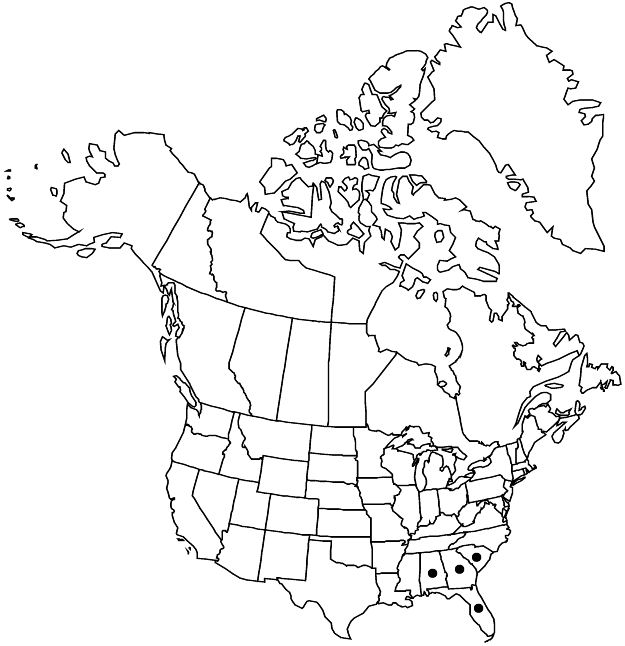Difference between revisions of "Piriqueta cistoides subsp. caroliniana"
Ann. Missouri Bot. Gard. 77: 351. 1990.
FNA>Volume Importer |
FNA>Volume Importer |
||
| Line 19: | Line 19: | ||
|name=Piriqueta caroliniana | |name=Piriqueta caroliniana | ||
|authority=(Walter) Urban | |authority=(Walter) Urban | ||
| − | }}{{Treatment/ID/Synonym | + | }} {{Treatment/ID/Synonym |
|name=P. caroliniana var. tomentosa | |name=P. caroliniana var. tomentosa | ||
|authority=Urban | |authority=Urban | ||
| − | }}{{Treatment/ID/Synonym | + | }} {{Treatment/ID/Synonym |
|name=P. caroliniana var. viridis | |name=P. caroliniana var. viridis | ||
|authority=(Small) G. S. Torrey | |authority=(Small) G. S. Torrey | ||
| − | }}{{Treatment/ID/Synonym | + | }} {{Treatment/ID/Synonym |
|name=P. glabra | |name=P. glabra | ||
|authority=unknown | |authority=unknown | ||
| − | }}{{Treatment/ID/Synonym | + | }} {{Treatment/ID/Synonym |
|name=P. viridis | |name=P. viridis | ||
|authority=unknown | |authority=unknown | ||
| Line 46: | Line 46: | ||
|elevation=0–60 m | |elevation=0–60 m | ||
|distribution=Ala.;Fla.;Ga.;S.C.;West Indies;South America. | |distribution=Ala.;Fla.;Ga.;S.C.;West Indies;South America. | ||
| − | |discussion=<p>Some authors consider subsp. caroliniana to be a species complex composed of multiple morphotypes that hybridize along a wide zone in Florida; North American populations would have been derived from three independent migrations from the northern Bahamas (M. B. Cruzan 2005; S. D. Maskas and Cruzan 2000; K. McBreen and Cruzan 2004; Jiongqion Wang and Cruzan 1998). The morphotypes differ mainly in leaf shape and indument; leaf traits and plasticity responses toward narrower shape and higher trichome density are associated with increased drought conditions (J. J. Picotte et al. 2009).</p> | + | |discussion=<p>Some authors consider <i></i>subsp.<i> caroliniana</i> to be a species complex composed of multiple morphotypes that hybridize along a wide zone in Florida; North American populations would have been derived from three independent migrations from the northern Bahamas (M. B. Cruzan 2005; S. D. Maskas and Cruzan 2000; K. McBreen and Cruzan 2004; Jiongqion Wang and Cruzan 1998). The morphotypes differ mainly in leaf shape and indument; leaf traits and plasticity responses toward narrower shape and higher trichome density are associated with increased drought conditions (J. J. Picotte et al. 2009).</p> |
|tables= | |tables= | ||
|references= | |references= | ||
| Line 70: | Line 70: | ||
|publication year=1990 | |publication year=1990 | ||
|special status=Selected by author to be illustrated | |special status=Selected by author to be illustrated | ||
| − | |source xml=https://jpend@bitbucket.org/aafc-mbb/fna-data-curation.git/src/ | + | |source xml=https://jpend@bitbucket.org/aafc-mbb/fna-data-curation.git/src/8f726806613d60c220dc4493de13607dd3150896/coarse_grained_fna_xml/V6/V6_303.xml |
|genus=Piriqueta | |genus=Piriqueta | ||
|species=Piriqueta cistoides | |species=Piriqueta cistoides | ||
Revision as of 17:47, 18 September 2019
Plants 10–60 cm. Leaves: petiole to 2(–8) mm; blade linear to elliptic or obovate, 8–70 × 1.5–22 mm, base cuneate to rounded, apex obtuse or acute, surfaces tomentose or glabrous. Peduncles and pedicels erect-ascending, combined length 6.5–22 mm. Flowers not self compatible; calyx 4.7–11 mm, tube 1.3–3 mm; petals 8–24 × 3–15 mm; stamens 3–5 mm in long-styled flowers, 5–9 mm in short-styled flowers; styles often forked, 3.5–6 mm in long-styled flowers, 1.3–3 mm in short-styled flowers. Capsules ovoid, 4–8 mm. Seeds 12–30, dark, 1.5–2.1 × 0.9–1.2 mm; aril unilateral, 1–2 mm. 2n = 14.
Phenology: Flowering and fruiting year-round.
Habitat: Marshes to dry pinelands and sand scrub, dry or scrubby flatwoods, sandhills, roadsides, other ruderal areas, sandy soil
Elevation: 0–60 m
Distribution

Ala., Fla., Ga., S.C., West Indies, South America.
Discussion
Some authors consider subsp. caroliniana to be a species complex composed of multiple morphotypes that hybridize along a wide zone in Florida; North American populations would have been derived from three independent migrations from the northern Bahamas (M. B. Cruzan 2005; S. D. Maskas and Cruzan 2000; K. McBreen and Cruzan 2004; Jiongqion Wang and Cruzan 1998). The morphotypes differ mainly in leaf shape and indument; leaf traits and plasticity responses toward narrower shape and higher trichome density are associated with increased drought conditions (J. J. Picotte et al. 2009).
Selected References
None.
